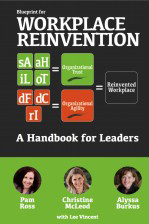
Sometimes it takes a crisis of some sort to teach us a lesson. This week, my friend Mark Gross had a small crisis in his business while he was flying from Montreal to Toronto to lead an event. He wrote a blog about it HERE, and this is my slightly abbreviated version and some leadership lessons (with excerpts from Mark’s full story).
Mark runs Amazing Race Canada – an event company that organizes what he describes as:
Team building events in the format of the TV show The Amazing Race. All of our events are custom designed and personalized. Every race is unique. The finished product is the result of countless hours of work including much logistical planning. The process for designing a race begins weeks before its execution.
Mark had been working for weeks to plan a “Race” in Toronto, and shared this tweet the night before the main event.
SO EXCITED for today’s race! T-15 hours to start….http://t.co/DDKjGsndIF — AmazingRace Canada (@AmazingRaceCAN) October 16, 2014
On Thursday morning, Mark boarded his flight a little late due to visibility issues in Toronto, but with plenty of time to spare to get set up for his Amazing Race… However, after the short flight to Toronto, they were unable to land, and after circling and finally making an attempt to land after 30 minutes, then a second attempt, the passengers received their update:
“Ladies and gentlemen, this is your captain speaking. As you’ve noticed, we have tried twice to land at Toronto City airport, but the fog is not permitting a safe landing… We will be proceeding to our alternate… (Pause)” He paused long enough for everyone in the middle of the plane to either mouth, or say aloud, “Pearson.” Then he continued. “Our alternate is Montreal. Arrival time in Montreal is…” A collective, audible gasp could be heard. I am confident that what came out of my mouth was a hushed “no!” though the voice inside my head screamed something that sounded more like “no <censored> way!”
If you’ve ever been on a timeline, with clients depending on you, or even just on a flight that takes hours and ends up right where you started, you probably have an idea of the sort of stress and frustration Mark may have been feeling… Here it is, in his words:
Now headed east, an intense feeling of resignation came over me. I started to rehash and question my decisions. Should I have flown the night before at this time of year? Could I have foreseen such a crazy delay? Did I do everything I needed to do to put myself in a position for success on this race? I was upset but I was taking it out on myself. I wanted to punch a seat. I joked with the flight attendants who asked me not to. I obliged.
Standing at the back of the plane, trapped without communication at 25,000 feet, I felt helpless. I tried to ignore that I would need to explain this to my client by getting into a conversation with the flight attendants. They were in good spirits. My inner voice explained their calmness as being “on the clock” and that they wouldn’t have to deal with the same consequences I would. I started to try to justify my bad mood.
And then, my feeling of helplessness bothered me more than the circumstances I found myself in. I became defiant. I looked at the flight attendants and said: “forget this! I’m going to make this work!” (Ummm.. the f-word I used wasn’t “forget”.)
I went back to my seat and pulled out my laptop and started preparing emails with the clues and instructions for my staff on the ground in Toronto. The clues would need to be reprinted and materials would need to be delivered, but I certainly wasn’t going to accomplish anything useful by brooding or feeling sorry for myself.
Long story short – as soon as the plane landed in Montreal, Mark sent off emails to his team outlining what needed to happen without him there. He called his client, committed to making the Race a success, and they agreed to postpone it by an hour. The Race went off without a hitch (other than the hour postponement) and everyone was happy in the end.
So what can leaders learn from this?
- TRUST. Sometimes it takes a crisis or some sort of catalytic event for us to step back and trust our people to manage through things without us. In Mark’s words “Race went great. I learned a lesson that day. Release the reins a bit…” I have rarely been let down when I put full trust in people to get their work done without my interfering. Move into trust before a crisis hits. Trust is the most important factor in building strong engagement and culture, and ultimately customer experience and results.
- STUFF HAPPENS. Don’t focus on what you have no control over. Focus on what you can control and influence. Mark chose not to feel helpless but to do what he could from 25,000 feet. The power you win when you focus on what is within your sphere of control is palpable. You lose that power when you give in to frustration, worry and anxiety.
- YOUR ATTITUDE CHANGES YOUR SITUATION. I love how Mark describes this: “I was recently told that “attitude is altitude”. Looking back, I will not soon forget how a change of attitude at an altitude of 25,000 feet changed the course of this fateful day. Sure, our circumstances have an effect on our lives, but having (and keeping) a positive attitude can overcome some of the most challenging situations we might encounter.”
- TRY A UNIQUE TEAM BUILDING EVENT! I can’t not include this as a tip – I mean, how fun would your own corporate Amazing Race be? Contact Mark to tailor an event for your group. And let me know how it was!
Want to get ahead of the competition & build TRUST, AGILITY & DIGITAL FLUENCY? Check out our eBooks!
| Workplace Reinvention Handbook describes how to build TRUST and AGILITY ($3.99) |
New eBook all about DIGITAL FLUENCY for Businesses (Sign up to receive it FREE) |
|---|---|
 |
 |
